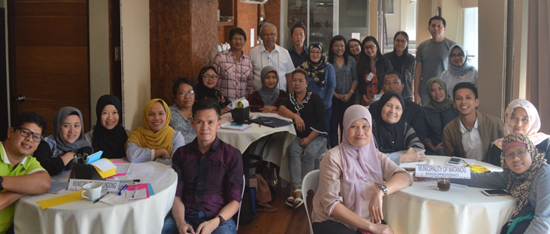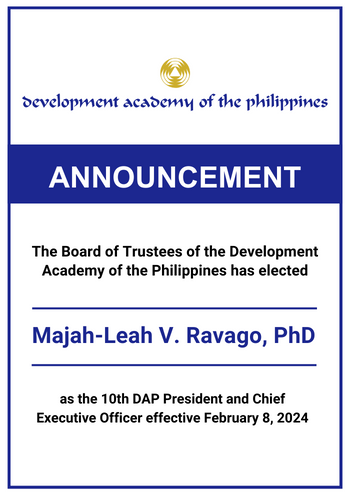
The Development Academy of the Philippines, through its Center for Governance, conducted the Course on Managing the Local Government Unit through Knowledge Creation for some 19 Autonomous Region in Muslim Mindanao managers on September 5-7, 2018 at the Pacifico Boutique Hotel in Cagayan de Oro City.
The course is the second under the Leadership Enhancement and Development training component of the Consulting Services for the Knowledge Co-Creation Programme of the Revenue Enhancement Assistance in ARMM LGUs (REAL) Sub-Project.
Entitled “Managing the LGU through Knowledge Creation,” the course aims to provide a good understanding of the dynamic process involved in creating, maintaining, and utilizing organizational knowledge. The intervention is also expected to facilitate fundamental changes in the participants’ organizational culture and ways of doing work.
Dr. Lizan Perante-Calina of the UP-National College of Public Administration and Governance (NCPAG) stressed the importance of innovation by discussing the Public Sector Reform Framework, which articulates reforms as contributory to governance transformation among public sector organizations. She also emphasized the notable relationship of the socialization-externalization-combination-internalization (SECI) process, knowledge creation, and phronetic leadership.
The course provided examples of organizations that have introduced innovative reforms. One of these is the experience of Alabat town in Quezon Province in establishing agriculture-based local economic development enterprises to help increase the revenue of the local government unit.
Another case is the experience of the National Statistics Office in addressing existing organizational problems through creative solutions and fostering phronesis in other problems through the SECI process.
Tomas “Butch” P. Africa, former NSO administrator and one of the resource speakers, said that he does not expect the public managers to be “perfect” but he expects them to be “excellent.” He also encouraged the participants to work together if they aim to achieve and succeed more as public servants.
The participants were asked to present their top accomplishments as public managers while highlighting the most innovative reform that they have undertaken to further understand the concept of the course.
During the sharing activity, majority of the participants said they have already started innovations in their respective offices. Most of these include reforms in structures, procedures, and processes. The participants then realized that while they were already practicing innovations, they have also been contributing to the overall organizational development of their LGU.
To cap the overall learning of the participants, the DAP training team facilitated a SECI workshop that helped the participants internalize the SECI model in the context of their LGUs.
The course was actually the second of four shuttle courses under the REAL Sub-Project, where the DAP was selected as a partner of the Japan International Cooperation Agency, in coordination with the DILG-ARMM, in its implementation.
The participants came from the municipalities of Ampatuan, Barira, Balindong, and Matanog. A participant from the DILG-ARMM also attended the training.
Participating LGUs are expected to attend two more courses under the program.




